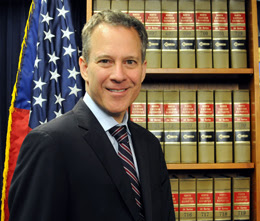
As part of that roadmap, A.G. Schneiderman also provided local governments with model laws and policies that, if voluntarily enacted by a local government, would codify “sanctuary” policies into local law. In recent years, several cities across New York State, including Syracuse and New York City, have successfully adopted such policies.
The model provisions offered by the A.G.’s Civil Rights Bureau clarify that local New York law enforcement agencies can limit their participation in federal immigration enforcement activities in several ways, including by: (1) refusing to enforce non-judicial civil immigration warrants issued by Immigration and Customs Enforcement (“ICE”) or Customs and Border Protection (“CBP”), (2) protecting New Yorkers’ Fourth Amendment rights by denying federal requests to hold uncharged individuals in custody more than 48 hours, (3) limiting access of ICE and CBP agents to individuals currently in custody, and (4) limiting information gathering and reporting that will be used exclusively for federal immigration enforcement. The full policy guidance can be found here.
“Public safety relies on trust between law enforcement and the communities they serve. No local law enforcement agency should have to undercut that trust just to carry out Donald Trump’s draconian immigration policies,” said Attorney General Schneiderman. “The legal guidance and model policies my office released today give local governments the tools they need to protect immigrant communities from any over-reach by federal agencies. New York has a long history of welcoming immigrants and embracing diversity. Now, more than ever, we must stand up for our values of inclusion and pluralism.”
In addition to protecting vulnerable communities and promoting public safety, the A.G.’s model procedures would also insulate local authorities from potential legal liability arising out of Fourth Amendment (unlawful detention) claims and ensure that local governments are not forced to spend limited local resources on increased federal immigration enforcement efforts that do not improve public safety.
“Rochester is the home of Frederick Douglass and Susan B. Anthony, so the fight for inclusion and equality is nothing new to us,” said Rochester Mayor Lovely Warren. “As an African American woman and the child of an immigrant, I am keenly aware of what discrimination feels like, and equally aware that it has no place or part in the ‘American Dream.’ In 1986, the Rochester City Council passed a resolution declaring us a ‘City of Sanctuaries,’ and I intend to ask our current City Council to bring this resolution up to date and reflect some of Attorney General Schneiderman’s recommendations. I want to make it clear that in Rochester we are one community that is united and strengthened by our diversity, and no citizens should be denied access to jobs, safe and vibrant neighborhoods or quality educational opportunities simply because of who they are.”
“Cities have long been welcoming and inclusive places and I am proud Syracuse is standing with our immigrant brothers and sisters in that tradition of diversity,” said Syracuse Mayor Stephanie A. Miner. “As long as I am Mayor, we will not use our resources to enforce federal anti-immigrant policies. I appreciate the Attorney General standing with cities like Syracuse and offering his support as we make these decisions for our citizens.”
This guidance for local officials continues Attorney General Schneiderman’s ongoing efforts to protect immigrant New Yorkers and safeguard the trust between law enforcement and other local and state agencies and the communities they serve:
- In December 2014, when the Obama administration replaced the Secure Communities program, which relied on local cooperation in immigration enforcement actions, with the more narrowly drawn Priority Enforcement Program, Attorney General Schneiderman sent a letter to police chiefs and sheriffs statewide advising them that they have discretion in deciding whether to comply with ICE or CBP requests for assistance.
- The Attorney General has secured settlements with 24 school districts across the state to ensure equal access to education regardless of immigration status.
- After the election and amid a rise in hate incidents across the nation, the Attorney General issued an urgent bulletin to local law enforcement officials statewide to provide guidance in identifying and prosecuting hate crimes.
- The Attorney General also sent a joint letter with the New York State Department of Education providing guidance to local school districts on how to ensure schools are safe havens where students are free to learn without fear of discrimination, harassment or intimidation directed toward students and employees as a result of their race, ethnicity, religion, immigration status, disability, sexual orientation, gender identity or any other basis.
- Similarly, the Attorney General issued a fraud alert on immigration scams, amid post-election reports of a rising incidence of immigration services fraud by scammers preying on immigrants’ fears.
- Attorney General Schneiderman successfully called on President Obama to dismantle the discriminatory Bush-era NSEERS registry, in order to prevent the creation of the unconstitutional Muslim registry that the president-elect has called for.
This Attorney General’s guidance was developed by Special Counsel Jessica Attie, Assistant Attorneys General Justin Deabler and Anjana Samant of Civil Rights, and Senior Advisor and Special Counsel Laura Wood, led by Civil Rights Bureau Chief Lourdes M. Rosado, and Assistant Attorney General Nicholas P. Stabile of the New York City Litigation Bureau and Deputy Solicitor General Anisha DasGupta of the Appeals & Opinion Bureau. The New York City Litigation Bureau is overseen by Kent T. Stauffer, Executive Deputy Attorney General of the State Counsel Division. The Social Justice Division is led by Executive Deputy Attorney General Alvin Bragg.

